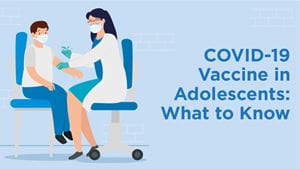
On May 11, 2020, the FDA approved the Pfizer/BioNTech COVID-19 vaccine for emergency use authorization among adolescents aged 12-15.
With the expansion of eligibility, children and their parents are wondering about the safety and efficacy of the Pfizer vaccine in adolescents. Dr. Steven Schulz, a pediatrician at Rochester Regional Health, answers common questions.
Pfizer/BioNTech conducted a clinical trial with 2,260 participants ages 12 through 15. Of these, 1,131 adolescents received both doses of the vaccine and were monitored for at least two months after receiving the second dose.
After close monitoring of side effects and reactions, the results of the study demonstrate that the Pfizer/BioNTech COVID-19 vaccine is safe for those age 12-15. Health and government organizations will continue to monitor the safety of the vaccine in the entire population, including longer-term safety follow-ups for the newly authorized age group.
The dosage of the COVID-19 vaccine administered in children ages 12-15 will be the same as that in individuals 16 and above. They should receive both doses of the Pfizer vaccine 21 days apart.
In Pfizer’s clinical trial of 1,131 children, the vaccine was shown to be safe and 100% effective.
“I recommend that both eligible parents and children get the vaccine as soon as they can. It will prevent severe illness from COVID-19, and it will slow the spread in our community, in our state, and in our country,” explained Dr. Schulz.
In the clinical trial, many participants age 12-15 had similar side effects to young adults. They often described arm soreness, mild fatigue, and headache. Less frequently, participants age 12-15 reported fever, joint pain, and nausea.
“Children ages 12-15 should not expect any difference in side effects than those that are common in adults,” said Dr. Schulz.
Children can get sick from coronavirus infection and they can infect others. While cases are often less severe, there are instances of serious complications in children resulting from COVID-19 infection.
In the United States, over 3.85 million children have tested positive for COVID-19 since March 2020.
“In our clinic, we have seen patients that have developed Multisystem Inflammatory Syndrome (MIS-C) and in the United States, there have been deaths reported of children from COVID-19,” said Dr. Schulz. “Adolescents having the vaccine removes those possibilities of severe illness or death.”
The FDA recommends that those with a known history of severe allergic reactions, including anaphylaxis, to any component of the Pfizer/BioNTech COVID-19 vaccine should not receive the vaccine.
If a child age 12-15 has a history of significant allergic reactions to vaccines, talk with their primary care provider or allergist about his or her ability to get the vaccine and likeliness of experiencing a reaction. Even for children with a history of severe allergies, it is often still safe for them to receive the vaccine.
Children will not receive the COVID-19 vaccine without consent from a parent or guardian, who should be present at the time of both vaccine doses for any adolescent age 12-17 years old.
The Pfizer/BioNTech COVID-19 vaccine is the only approved vaccine under EUA for those ages 12-15. Parents should ensure that they are scheduling appointments when and where this vaccine is available.
Appointments can be found at the Finger Lakes Vaccine Hub.